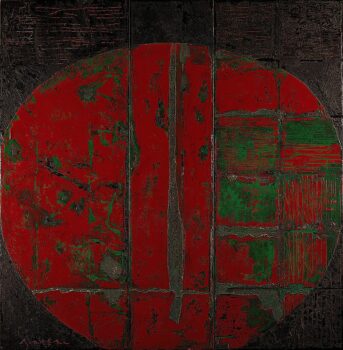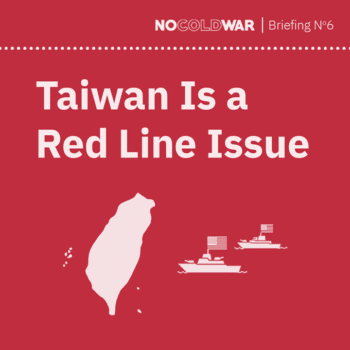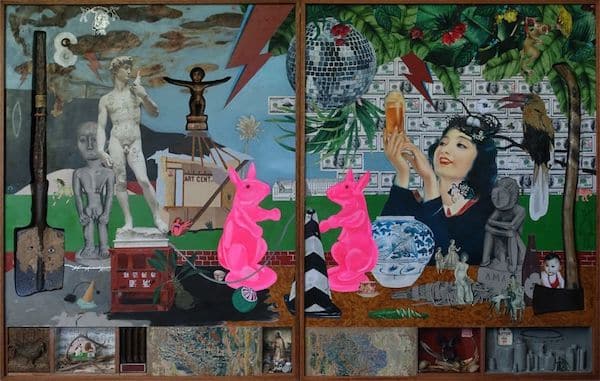Dear friends,
Greetings from the desk of Tricontinental: Institute for Social Research.

Su Xiaobai (China), Great Consummation-3, 2008.
On 2 February 2023, President Ferdinand Marcos Jr. of the Philippines met with U.S. Defence Secretary Lloyd Austin at Malacañang Palace in Manila, where they agreed to expand the U.S. military presence in the country. In a joint statement, the two governments agreed to ‘announce their plans to accelerate the full implementation of the Enhanced Defence Cooperation Agreement (EDCA)’ and ‘designate four new Agreed Locations in strategic areas of the country’. The EDCA, which was agreed upon in 2014, allows the U.S. to use land in the Philippines for its military activities. It was formulated almost a quarter of a century after U.S. troops vacated their bases in the Philippines—including a massive base at Subic Bay—during the collapse of the USSR.
At that time, the U.S. operated on the assumption that it had triumphed and no longer required the vast structure of military bases it had built up during the Cold War. From the 1990s, the U.S. assembled a new kind of global footprint by integrating the militaries of allied countries as subordinate forces to U.S. military control and building smaller bases to create a much greater reach for its technologically superior airpower. In recent years, the U.S. has been faced with the reality that that its apparent singular power is being challenged economically by several countries, such as China. To contest these challenges, the U.S. began to rebuild its military force structure through its allies and more of these smaller, but no less lethal, base structures. It is likely that three of the four new bases in the Philippines will be on Luzon Island, at the north of the archipelago, which would place the U.S. military within striking distance of Taiwan.
 For the past fifteen years, the U.S. has pushed its allies—including those organised in the North Atlantic Treaty Organisation (NATO)—to strengthen their military power while increasing its techno-military power and reach by establishing smaller bases across the world and producing new aircraft and ships with greater territorial reach. This military force was then used in a series of provocative actions against those it perceived as threats to its hegemony, with two key countries, China and Russia, facing the sharp edge of the U.S. spear. At the two ends of Eurasia, the U.S. began to provoke Russia through Ukraine and provoke China through Taiwan. The provocations over Ukraine have now resulted in a war that has been ongoing for a year, while the new U.S. bases in the Philippines are part of an escalation against China, using Taiwan as a battleground.
For the past fifteen years, the U.S. has pushed its allies—including those organised in the North Atlantic Treaty Organisation (NATO)—to strengthen their military power while increasing its techno-military power and reach by establishing smaller bases across the world and producing new aircraft and ships with greater territorial reach. This military force was then used in a series of provocative actions against those it perceived as threats to its hegemony, with two key countries, China and Russia, facing the sharp edge of the U.S. spear. At the two ends of Eurasia, the U.S. began to provoke Russia through Ukraine and provoke China through Taiwan. The provocations over Ukraine have now resulted in a war that has been ongoing for a year, while the new U.S. bases in the Philippines are part of an escalation against China, using Taiwan as a battleground.
To make sense of the situation in East Asia, the rest of this newsletter will feature briefing no. 6 from No Cold War, Taiwan Is a Red Line Issue, which is also available for download as a PDF.
In recent years, Taiwan has become a flashpoint for tensions between the United States and China. The seriousness of the situation was recently underscored on 21 December, when U.S. and Chinese military aircraft came within three metres of each other over the South China Sea.
At the root of this simmering conflict are the countries’ diverging perspectives over Taiwan’s sovereignty. The Chinese position, known as the ‘One China’ principle, is firm: although the mainland and Taiwan have different political systems, they are part of the same country, with sovereignty residing in Beijing. Meanwhile, the U.S. position on Taiwan is far less clear. Despite formally adopting the One China policy, the U.S. maintains extensive ‘unofficial’ relations and military ties with Taiwan. In fact, under the Taiwan Relations Act of 1979, U.S. law requires Washington to provide arms ‘of a defensive character’ to the island.
The U.S. justifies its ongoing ties with Taiwan by claiming that they are necessary to uphold the island’s ‘democracy’ and ‘freedom’. But, how valid are these claims?
A Foothold for Influence

Chu Weibor (China), Sun in the Heart, 1969.
To understand the contemporary geopolitical significance of Taiwan, it is necessary to examine Cold War history. Prior to the Chinese Revolution of 1949, China was in the midst of a civil war between the communists and the nationalists, or Kuomintang (KMT)—the latter of which received billions of dollars in military and economic support from Washington. The revolution resulted in the establishment of the People’s Republic of China (PRC) on the mainland, while the defeated KMT forces fled to the island of Taiwan, which had returned to Chinese sovereignty four years earlier, in 1945, following fifty years of Japanese colonial rule. From Taipei, the KMT declared that they were the rightful government-in-exile of all of China under the name of the Republic of China (ROC)—originally founded in 1912—thereby rejecting the legitimacy of the PRC.
The U.S. military soon followed, establishing the United States Taiwan Defence Command in 1955, deploying nuclear weapons to the island, and occupying it with thousands of U.S. troops until 1979. Far from protecting ‘democracy’ or ‘freedom’ in Taiwan, the U.S. instead backed the KMT as it established a dictatorship, including a 38-year-long consecutive period of martial law from 1949—1987. During this time, known as the ‘White Terror’, Taiwanese authorities estimate that 140,000 to 200,000 people were imprisoned or tortured, and 3,000 to 4,000 were executed by the KMT. Washington accepted this brutal repression because Taiwan represented a useful foothold—located just 160 kilometres off the south-eastern coast of the Chinese mainland—that it used to pressure and isolate Beijing from the international community.
From 1949—1971, the U.S. successfully manoeuvred to exclude the PRC from the United Nations by arguing that the ROC administration in Taiwan was the sole legitimate government of the entirety of China. It is important to note that, during this time, neither Taipei nor Washington contended that the island was separate from China, a narrative that is advanced today to allege Taiwan’s ‘independence’. However, these efforts were eventually defeated in 1971, when the UN General Assembly voted to oust the ROC and recognise the PRC as the only legitimate representative of China. Later that decade, in 1979, the U.S. finally normalised relations with the PRC, adopted the One China policy, and ended its formal diplomatic relations with the ROC in Taiwan.
For Peace in Taiwan, U.S. Interference Must End
Today, the international community has overwhelmingly adopted the One China policy, with only 13 of 193 UN member states recognising the ROC in Taiwan. However, due to the continued provocations of the U.S. in alliance with separatist forces in Taiwan, the island remains a source of international tension and conflict.

Huang Yuxing (China), Trees of Maturity, 2016.
The U.S. maintains close military ties with Taiwan through arms sales, military training, advisors, and personnel on the island, as well as repeatedly sailing warships through the narrow Taiwan Strait that separates the island from the mainland. In 2022, Washington pledged $10 billion in military aid to Taiwan. Meanwhile, U.S. congressional delegations regularly travel to Taipei, legitimising notions of separatism, such as a controversial visit by former U.S. Speaker of the House of Representatives Nancy Pelosi in August 2022.
Would the U.S. or any other Western country accept a situation where China provided military aid, stationed troops, and offered diplomatic support to separatist forces in part of its internationally recognised territory? The answer, of course, is no.
In November, at the G20 summit in Indonesia, Chinese President Xi Jinping and U.S. President Joe Biden held their first in-person meeting since Biden was elected president. At the meeting, Xi strongly reiterated China’s stance on Taiwan, telling Biden that: ‘the Taiwan question is at the very core of China’s core interests, the bedrock of the political foundation of China-US relations, and the first red line that must not be crossed’. Although Biden responded by stating that the U.S. adheres to the One China policy and that he is ‘not looking for conflict’, just a few months prior, he affirmed in a televised interview that U.S. troops would militarily intervene to ‘defend Taiwan’, if necessary.
It is clear from the US’s track record that Washington is intent on provoking China and disregarding its ‘red line’. In Eastern Europe, a similarly reckless approach, namely the continued expansion of NATO towards Russia’s border, led to the outbreak of war in Ukraine. As progressive forces in Taiwan have declared, ‘to maintain peace in the Taiwan Strait and avoid the scourge of war, it is necessary to stop U.S. interference’.
On 31 January, Pope Francis conducted a mass in the Democratic Republic of the Congo (DRC) with a million people in attendance, where he declared that ‘Political exploitation gave way to an “economic colonialism” that was equally enslaving’. Africa, the Pope said, ‘is not a mine to be stripped or a terrain to be plundered. Hands off Africa!’. Later that same week, the U.S. and the Philippines—in complete disregard of the pope’s declaration—agreed to build new military bases, completing the encirclement of U.S.-allied bases around China and intensifying U.S. aggression towards the country.
The pope’s cry could very well be ‘Hands off the world’. This of course means no new Cold War, no more provocations.
Warmly,
Vijay

